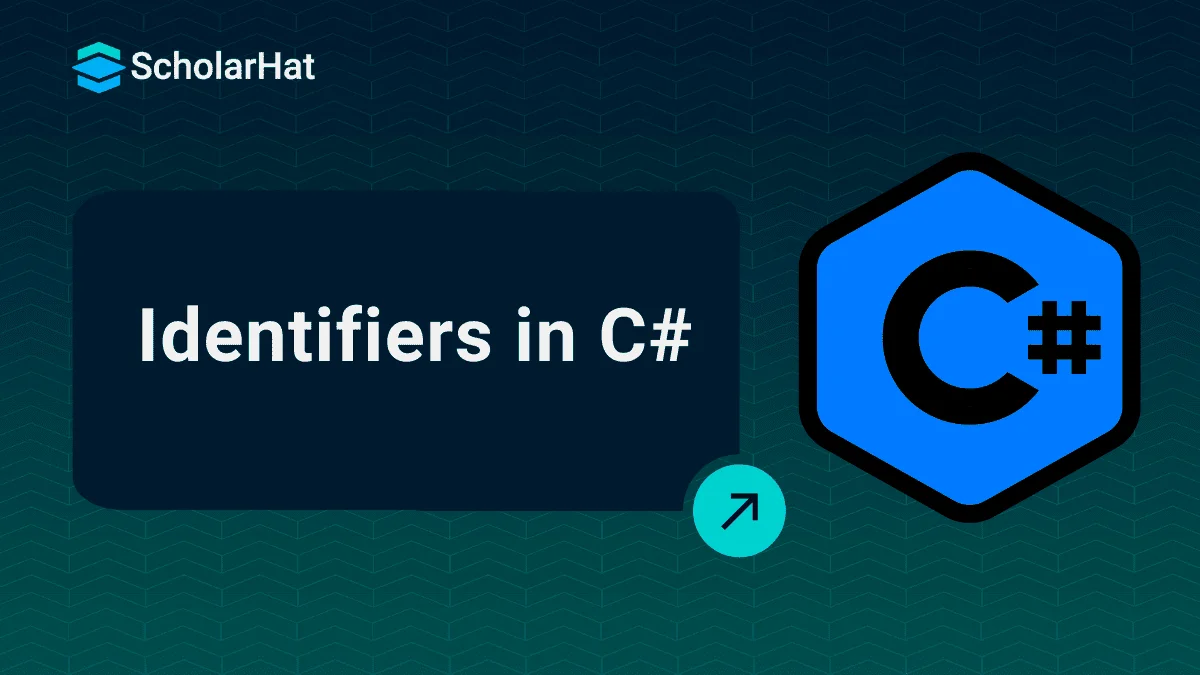24
JanIdentifiers in C# - A Beginner's Guide ( With Examples )
Identifiers in C#
An identifier in C# is simply a name used to identify a variable, method, class, or any other entity in your program. C# identifiers must start with a letter (A-Z, a-z) or an underscore (_), followed by letters, digits (0-9), or underscores. These names are case-sensitive, meaning myVariable and MyVariable would be considered different. C# also has reserved keywords that you can't use as identifiers, such as int, class, or void. By following the rules for identifiers, you’ll make your code clearer and more readable!
Hence, In this C# Tutorial, we will explore the significance of identifiers in C# and their best practices in C# programming. C# skills can boost your salary by 22% in software development roles. Enroll in our Free C# Certification Course today!
What is an Identifier in C#?
In C#, an identifier is a user-defined name used to represent variables, methods, classes, interfaces, or other program entities. Identifiers must start with a letter or underscore, followed by letters, digits, or underscores, and cannot be a reserved keyword. Identifiers are case-sensitive and enhance code readability.
Read More - C Sharp Interview Questions
Rules of Naming Identifiers in C#
- Start with a Letter or Underscore: Identifiers must begin with a letter (A-Z, a-z) or an underscore (_).
- Subsequent Characters: Following the initial character, identifiers can include letters, digits (0-9), and underscores (_).
- Case Sensitivity: C# is case-sensitive; uppercase and lowercase letters are considered distinct. For example,
variableNameandVariableNameare different identifiers. - Keywords: Identifiers cannot be a reserved keyword; they have specific meanings in the C# language and cannot be used as identifiers.
- Length: There is no specific length limit for identifiers, but it's a good practice to keep them reasonably short and descriptive for readability.
- Unicode Characters: C# supports Unicode characters, allowing identifiers to include characters from various languages and symbols.
- Meaningful and Descriptive: Identifiers should be meaningful and descriptive, reflecting the purpose or content they represent, and enhancing code readability and maintainability.
- Camel Case: It's a common convention to use camel case for identifiers (e.g.,
myVariableName) to improve readability. Classes often use Pascal case (e.g.,MyClassName) for naming. - Avoid Special Characters: Special characters like @, $, and % are not allowed in identifiers.
- Consistency: Maintain a consistent naming convention throughout the codebase to enhance collaboration and understanding among developers.
Example
using System;
namespace IdentifierExample
{
class Program
{
static void Main(string[] args)
{
// Variable identifiers
int myVariable = 42;
string myString = "Hello, World!";
// Method identifiers
SayHello();
int sum = AddNumbers(5, 7);
// Class identifiers
MyClass myObject = new MyClass();
myObject.PrintMessage();
// Namespace identifier
System.Console.WriteLine("Using System namespace");
Console.WriteLine($"Variable identifier: {myVariable}");
Console.WriteLine($"String identifier: {myString}");
Console.WriteLine($"Method identifier: Sum = {sum}");
}
// Method identifiers
static void SayHello()
{
Console.WriteLine("Hello from SayHello() method!");
}
static int AddNumbers(int a, int b)
{
return a + b;
}
// Class identifier
class MyClass
{
public void PrintMessage()
{
Console.WriteLine("Printing a message from MyClass.");
}
}
}
}
Explanation
This C# program in the C# Compiler demonstrates the usage of different types of identifiers in C#. It includes variable identifiers (myVariable, myString), method identifiers (SayHello, AddNumbers), a class identifier (MyClass), and a namespace identifier (System). The program invokes methods, creates objects, and displays output to showcase these identifiers' usage.
Output
Hello from SayHello() method!
Printing a message from MyClass.
Using System namespace
Variable identifier: 42
String identifier: Hello, World!
Method identifier: Sum = 12Conclusion
In conclusion, identifiers in C# are crucial elements used to name various program entities. They play a vital role in making code readable, maintainable, and self-explanatory. Choosing meaningful and consistent identifiers is a fundamental practice for writing clean and effective C# code.
By 2026, 70% of developer jobs will demand full-stack .NET skills. Stay ahead—enroll in our .NET full stack developer course and dominate the tech market!
Take our Csharp skill challenge to evaluate yourself!

In less than 5 minutes, with our skill challenge, you can identify your knowledge gaps and strengths in a given skill.











